be good at with to for的区别及用法
大连市第八中学初中英语八年级上册 Unit 2复习题(含解析)
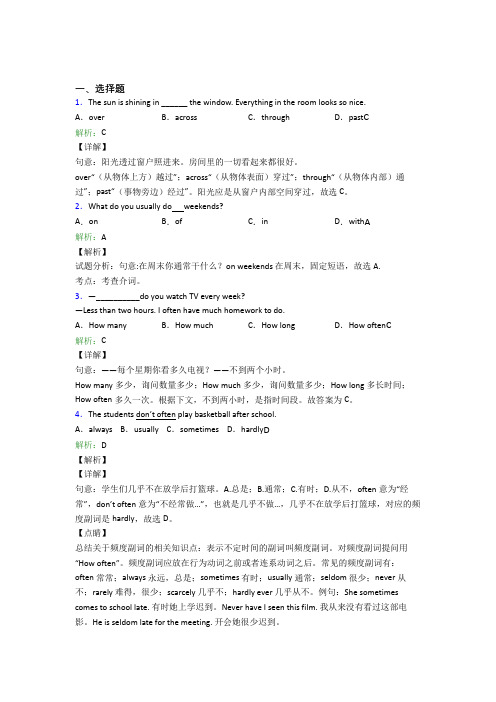
一、选择题1.The sun is shining in ______ the window. Everything in the room looks so nice.A.over B.across C.through D.past C解析:C【详解】句意:阳光透过窗户照进来。
房间里的一切看起来都很好。
over“(从物体上方)越过”;across“(从物体表面)穿过”;through“(从物体内部)通过”;past“(事物旁边)经过”。
阳光应是从窗户内部空间穿过,故选C。
2.What do you usually do weekends?A.on B.of C.in D.with A解析:A【解析】试题分析:句意:在周末你通常干什么?on weekends 在周末,固定短语,故选A.考点:考查介词。
3.—__________do you watch TV every week?—Less than two hours. I often have much homework to do.A.How many B.How much C.How long D.How often C解析:C【详解】句意:——每个星期你看多久电视?——不到两个小时。
How many多少,询问数量多少;How much多少,询问数量多少;How long多长时间;How often多久一次。
根据下文,不到两小时,是指时间段。
故答案为C。
4.The students don’t often play basketball after school.A.always B.usually C.sometimes D.hardly D解析:D【解析】【详解】句意:学生们几乎不在放学后打篮球。
A.总是;B.通常;C.有时;D.从不,often意为“经常”,don’t often意为“不经常做…”,也就是几乎不做…,几乎不在放学后打篮球,对应的频度副词是hardly,故选D。
初中英语七年级下册《Lesson 13 How Is School Going》
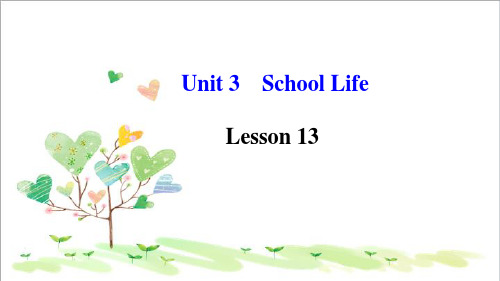
【活学活用】 ①第一节课8:45结束。 The first class ________ at 8: 45. ②一小时后,我们将做完作业。 We will ________ ________ our homework in an hour. 答案:①finishes ②finish doing
2. We always have a big sports meet twice a year. 我们总是每年举行两次大的运动会。 【自主领悟】twice作副词,表示次数,意为“两次”。twice a year每年两次。例如:I go to borrow books from the library twice a month. 我一个月去图书馆借两次书。
【归纳拓展】twice的用法
次数
twice在英语中表示次数时,习惯用once表示“一次”,twice表示“两 次”,三次以上用“...times”表示
倍数
twice也可以表示倍数,意为“两倍”,相当于two times。例如:He is twice as tall as the kid.他的身高是那个孩子的两倍。
be gooiendly/kind to。例如:My mom is always good to me.妈妈一直对我很好。
be good for
“对……有好处”,反义短语为be bad for。例如:Running is good for our health.跑步对我们的健康有好处。
【活学活用】
①The boy goes shopping with his mother ________ a month.
A. two
B. twice
C. two times D. second
初中英语介词的使用口诀表
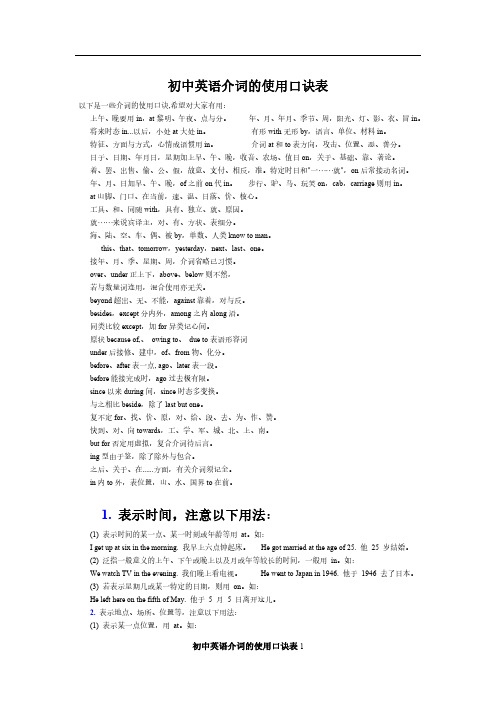
over、under 正上下,above、below 则不然,
若与数量词连用,混合使用亦无关。
beyond 超出、无、不能,against 靠着,对与反。
besides,except 分内外,among 之内 along 沿。
同类比较 except,加 for 异类记心间。
原状 because of,、 owing to、 due to 表语形容词
初中英语介词的使用口诀表 1
We live at No 87 Beijing Road. 我们住在北京路 87 号。 The hospital is at the end of the street. 医院在这条街的尽头。 与名词所有格连用表示地点,也用 at。如: at my sister’s 在我姐姐家 at the doctor’s 在医务室 (2) 表示空间或范围,用 in。如: What’s in the box? 这盒子里有什么? He lives in Paris with his wife. 他同他妻子住在巴黎。 但有时两者可换用。如: The meeting was held at [in] the hotel. 会议在宾馆举行。 (3) at 与 in 的另一个区别是:at 用于指较小的地方,而 in 用于指较大的地方。如: in Shanghai 在上海 at the station 在车站 但是,大与小是相对的,有时随着说话者的着眼点不同,大地方也可能用 at(比如把一个大地方看作一 个点时)。如: Our plane refuelled at London. 我们的飞机在伦敦加油。 We stopped for an hour at Moscow on our way to Paris. 我们在去巴黎的途中在莫斯科停了 1 个小时。 (4) 介词 on 用于地点,主要指在某物的表面。如: What’s on the table? 桌上有什么? There’s a wallet lying on the ground. 地上有个钱包。 注:在少数搭配中,也用介词 on。如: He works on a farm. 他在农场工作。 3. 在某些搭配中,三者的区别与英国英语和美国英语有关: in the street (英) / on the street (美) 在街上 in the road (英) / on the road (美) 在路上 in the team (英) / on the team (美) 在这个队 at the weekend (英) / on the weekend (美) 在周末 at weekends (英) / on weekends (美) 在周末 4. 有时三者的差别与搭配习惯和用法有关: in bed / on the bed 在床上(from ) in the tree (多指树外之物) / on the tree (多指树本身之物) 在树上
英语核心词汇详解be good at for to with辨析

英语核心词汇详解be good at for to with辨析1、be good at (doing) sth.擅长于=do well in,后接技能、学科I am good at English,but Mary is good at maths.我擅长英语,但是玛丽擅长数学。
2、be good for ...对……有益与be bad for..(对......有害)是一对反义词be good for health 有益于健康Eating more vegetables is good for your health. 蔬菜对你的健康有好处。
Smokingis bad for your health. 吸烟对你的健康有害处。
3、be good with 对……有办法,善于应付……后接人或具体的事物,相当于get along withMary is good with old people. 玛丽和老人们相处的很好。
The new teacher is good with the children.新来的老师能和孩子们打成一片。
4、be good to 对…友好/有好处=be friendly toMy dad always says that we should be good to others.我爸爸总是说我们应该对别人友好。
三者都表示“参加”,区别如下:一、attend 指出席、参加较为正式的场合,如上课、讲座、报告、会议、婚礼等。
Tom has to attend lots of classes at weekends.汤姆周末要上很多课。
He did not attend the meeting yesterday.昨天他没有参加会议。
二、join 指加入某组织并成为其中一员。
固定搭配:join sb. in (doing) sth. 和某人一道做某事I will never forget the day when I joined the Party. 我永远也忘不了入党的那一天。
初一下英语常用语法知识——名词阶段练习(含答案)
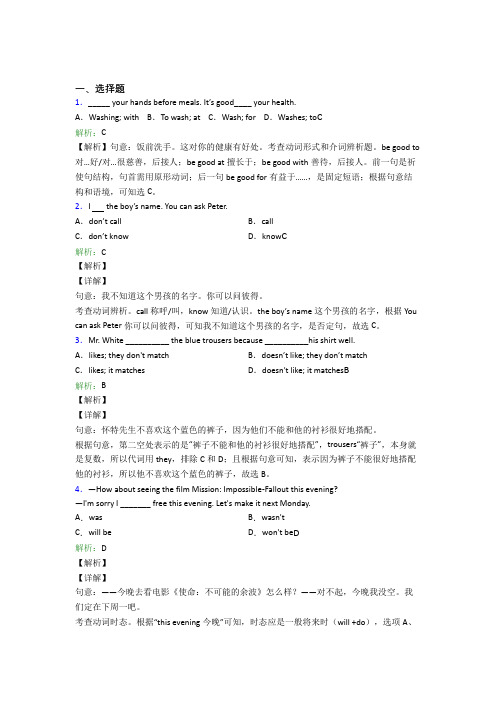
一、选择题1._____ your hands before meals. It’s good____ your health.A.Washing; with B.To wash; at C.Wash; for D.Washes; to C解析:C【解析】句意:饭前洗手。
这对你的健康有好处。
考查动词形式和介词辨析题。
be good to 对…好/对…很慈善,后接人;be good at擅长于;be good with善待,后接人。
前一句是祈使句结构,句首需用原形动词;后一句be good for有益于……,是固定短语;根据句意结构和语境,可知选C。
2.I the boy’s name. You can ask Peter.A.don’t call B.callC.don’t know D.know C解析:C【解析】【详解】句意:我不知道这个男孩的名字。
你可以问彼得。
考查动词辨析。
call称呼/叫,know知道/认识。
the boy’s name这个男孩的名字,根据You can ask Peter你可以问彼得,可知我不知道这个男孩的名字,是否定句,故选C。
3.Mr. White __________ the blue trousers because __________his shirt well.A.likes; they don't match B.doesn’t like; they don’t match C.likes; it matches D.doesn't like; it matches B解析:B【解析】【详解】句意:怀特先生不喜欢这个蓝色的裤子,因为他们不能和他的衬衫很好地搭配。
根据句意,第二空处表示的是“裤子不能和他的衬衫很好地搭配”,trousers“裤子”,本身就是复数,所以代词用they,排除C和D;且根据句意可知,表示因为裤子不能很好地搭配他的衬衫,所以他不喜欢这个蓝色的裤子,故选B。
Unit5-What-are-the-shirts-made-of-教学设计-教案

教学准备1. 教学目标1. 语言知识目标:1) 能掌握以下单词: chopsticks, coin, fork, blouse, silver, glass, cotton, steel, grass, leaf, produce, widely, be known for, process, pack能掌握以下句型:①—This ring looks nice. Is it made of silver? —Yes, and it was made in Thailand.② What is it made of/from?③ China is famous for tea, right?④ Where is tea produced in China?2) 能够用英语描述及询问物品的制作材料,正确理解被动语态的用法及句子结构。
2. 情感态度价值观目标:了解一些日常用品的制成材料,增加生活常识,养成良好的生活习惯;了解一些地方知名产品或传统艺术品的制作过程以及制作材料,培养学生的民族自豪感及爱国主义精神。
2. 教学重点/难点1. 教学重点:1) 掌握本课时中出现的生词2) 能够用英语描述及询问物品的制作材料3)正确理解被动语态的用法及句子结构。
2. 教学难点:理解被动语态的用法及句子结构。
3. 教学用具多媒体设备4. 标签教学过程Step 1 Lead in 让学生们了解这个中国传统发明的情况。
T: Who invented paper first?S1: Can Lun invented it in Han dynasty.T: What was paper made of then?S2: It was mainly made of bamboo.T: was it easy for people to make paperthen?S1: No, it was very difficult then.T: What is paper made of now?S3: It’s mainly made of wood, bamboo, andcotton.…Step 2 Presentation Present the sentence structure, using the pictures on the bigscreen:—What’s the golden medal made of?—It’s made of gold.—Isthis table made of wood?—No, it isn’t. It’s made of glass.—Is Butter made from meat?—No. It’s made from cream?让学生们学习掌握be made of/from句型的用法,及be made of与be made from的区别。
人教版初中英语七年级下册Unit1SectionA教材全解

人教版初中英语七年级下册Unit1SectionA教材全解Unit 1 Can you play the guitar?Unit 1 Section A教材全解1.play chess下国际象棋【重点注释】play后面跟棋牌、球类或其他体育方面的名词时,不加任何冠词。
例如:Can you play chess?你会下棋吗?Let’s go and play soccer。
咱们去踢足球吧。
I want to play chess with you.我想和你下国际象棋。
【拓展记忆】动词play的其他用法:①play后面跟乐器时,需要用定冠词the。
例如:I can play the guitar。
我会弹吉他。
He likes playing the drum.他喜欢打鼓。
②play后面跟玩具或其他名词时,一般加介词with。
play with…玩……;玩弄……。
例如:Dolphins can play with a ball.海豚会玩球。
Children can’t play with fire.小孩不能玩火。
【试题链接】Bill likes playing basketball,but he doesn’t like playing piano. A。
the;the B。
/;the C.the;/(球类运动前不加冠词;乐器前加定冠词the,故选B)2.speak English说英语【重点注释】①speak的意思是“说话",作及物动词时,意为“说(某种语言)”,其后的宾语为某种语言。
例如:Does he speak English?他会说英语吗?注意:say it in English意思是“用英语说它”,注意此处不要用speak。
in English “用英语",如:What’s this in English?Please say it in English。
②speak作不及物动词时,意思是“说话”,通常指说话的能力和方式;还可表示“作演讲,发言”之意.例如:The child can't speak.这个孩子不会说话。
备战2023年高考英语一轮复习考点帮(全国通用)考点 04 介词和介词短语和数词(解析版)

考点04 介词和介词短语与数词(重难考点精讲练)介词在英语中比较活跃,在高考中,对介词的考查主要集中在语法填空和短文改错题型中,考查点为常见介词如,from,to, on, in, with, by, at, of , on 等等的基本用法上。
语法填空中介词的考查形式为非提示词型,短文改错中介词的考查包括介词的误用以及多词少词。
预计2023年高考对介词的考查将不再局限于单个介词,将会更加注重对介词基本用法和固定搭配中的介词的考查。
在短文改错中,主要考查对介词的误用。
数词1. 掌握主要介词的常见用法及易混介词的辨析;2. 掌握介词与其他词所构成的一些固定短语;3. 掌握在定语从句中介词的使用情况。
一、介词介词的分类分类特点例词简单介词即一个介词about, across, after, against, among, around, at, below, beyond, during, in, on等等。
合成介词由两个介词构成合成词into, onto, throughout, upon, within短语介词由短语构成according to, because of, instead of, up to, due to, owing to, thanks to等等。
双重介词由两个介词搭配而成from among, from behind, from under, till after, in between等等。
分词介词由现在分词转化而来considering(就……而论), including,regarding,concerning等。
兼类介词由形容词直接转化而来like, unlike, near, next, opposite等等。
考向一、介词短语的功能介词不能独立在句中做成份,介词后必须与名词、代词、或动名词构成介词短语在句中充当一个成分,表示人、物、事件等与其它人、物、事件等之间的关系。
初一英语重要知识点汇总

初一英语知识点:重要语法重要语法1.人称代词的用法;2. 祈使句;3. 现在进行时的构成和用法;4.动词have的用法;5.一般现在时构成和用法;6.可数名词和不可数名词的构成和用法名师讲解1. That's right./ That's all right./ All right.That's right意为"对的",表示赞同对方的意见、看法或行为,肯定对方的答案或判断;例如:"I think we must help the old man.""我想我们应该帮助这位老人;""That's right."或 "You're right.""说得对";That's all right.意为"不用谢"、"没关系",用来回答对方的致谢或道歉;例如:"Many thanks." "That's all right.""Sorry. It's broken." "That's all right."All right.意为"行了"、"可以",表示同意对方的建议或要求;有时还可以表示"身体很好""Please tell me about it." "请把此事告诉我;""All right.""好吧;"Is your mother all right 你妈身体好吗2. make/do这两个词都可以解释为"做",但含义却不同,不能混用;make指做东西或制东西,do指做一件具体的事;Can you make a paper boat for me 你能为我做个纸船吗He's doing his homework now.他正在做他的作业;3. say/speak/talk/tellsay:是最口语化的最普通的一个词,意为"说出"、"说道",着重所说的话;如:"I want to go there by bus" , he said . 他说,"我要坐汽车到那里去;"Please say it in English .请用英语说;speak : "说话",着重开口发声,不着重所说的内容,一般用作不及物动词即后面不能直接接宾语 ;如:Can you speak about him 你能不能说说他的情况I don't like to speak like this. 我不喜欢这样说话;speak 作及物动词解时,只能和某种语言等连用,表达在对话中恰当使用词汇的能力;如:She speaks English well.她英语说得好;talk : 与 speak 意义相近,也着重说话的动作,而不着重所说的话,因此,一般也只用作不及物动词, 不过,talk 暗示话是对某人说的,有较强的对话意味,着重指连续地和别人谈话;如:I would like to talk to him about it . 我想跟他谈那件事;Old women like to talk with children.老年妇女喜欢和孩子们交谈;tell : "告诉",除较少情况外,一般后面总接双宾语;如:He's telling me a story.他在给我讲故事;tell a lie 撒谎tell sb. to do sth. /tell sb. not to do sth.Miss Zhao often tells us to study hard.4. do cooking/ do the cookingdo cooking 作"做饭"解,属泛指;do the cooking 特指某一顿饭或某一家人的饭;cooking为动名词,不能用作复数,但前面可用 some, much修饰;从do some cooking可引出许多类似的短语:do some washing 洗些衣服do some shopping 买些东西do some reading 读书do some writing 写些东西do some fishing 钓鱼从以上短语可引申出另一类短语,不能用some, much或定冠词;go shopping 去买东西go fishing 去钓鱼go boating 去划船go swimming 去游泳5. like doing sth./ like to do sth.like doing sth. 与like to do sth. 意思相同,但用法有区别;前者强调一般性的爱好或者表示动作的习惯性和经常性;后来表示一次性和偶然性的动作;例如:He likes playing football, but he doesn't like to play football with Li Ming.他喜欢踢足球,但是他不喜欢和李明踢;6. other/ others/ the other/ anotherother表其余的,别的,Have you any other questions你还有其他问题吗others 别的人,别的东西In the room some people are American, the others are French.在屋子里一些人是美国人,其他的是法国人;the other表另一个二者之中one…,the other…One of my two brothers studies English, the other studies Chinese.我两个哥哥中的一个学习英文,另一个学中文;another表三者以上的另一个,另一些There is room for another few books on the shelf.书架上还可以放点书;7. in the tree/ on the treein the tree 与 on the tree.译成中文均为"在树上"但英语中有区别;in the tree表示某人、某事不属于树本身生长出的别的东西落在树上,表示树的枝、叶、花、果等长在树上时,要使用on the tree.如:There are some apples on the tree. 那棵树上有些苹果;There is a bird in the tree. 那棵树上有只鸟;8. some/ any1some和 any既可修饰可数名词,也可修饰不可数名词;但有以下两点需要注意;some常用于肯定句中,any常用于否定句和疑问句中;如:There is some water in the glass.Is there any water in the glassThere isn't any water in the glass.2在说话者希望得到肯定答复的一般疑问句中,或在表示请求,邀请的疑问句中,我们依然用some;如:Would you like some tea9. tall/ high1说人,动物,树木等有生命的东西,主要用tall,不用high,例如a tall woman 一个高个子妇女a tall horse 一个高大的马2说一个不与地面接触的人和物的高时,要用high,而不用tall,比如人站在桌子上时,飞机飞上天时,例如:He is high up in the tree. 他高高地爬在树上;The plane is so high in the sky. 飞机在空中这么高;3指建筑物、山时要tall或high都可以,不过high的程度比tall高;4high可作副词,tall不能;5tall的反义词为short, high的反义词为low.10. can/ could1 can表示体力和脑力方面的能力,或根据客观条件能做某种动作的"能力";例如:Can you ride a bike 你会骑自行车吗What can I do for you 要帮忙吗Can you make a cake你会做蛋糕吗2 can用在否定句和疑问句中时有时表示说话人的"怀疑""猜测"或不肯定;例如:Where can he be他会在什么地方呢Can the news be true这个消息会是真的吗It surely can't be six o'clock already不可能已经六点钟了吧You can't be hungry so soon,Tom,you've just had lunch.汤姆,你不可能饿得这么快,你刚吃过午饭;What can he mean他会是什么意思在日常会话中,can可代替may表示"允许",may比较正式;例如:You can come in any time.你随时都可以来;--- Can I use your pen我能用你的钢笔吗--- Of course,you can.当然可以;You can have my seat,I'm going now.我要走了,你坐我的座位吧;3 couldcould 是 can的过去式,表示过去有过的能力和可能性在否定和疑问句中;例如:The doctor said he could help him.能力医生说他能帮助他;Lily could swim when she was four years old.能力当丽丽四岁的时候她就会游泳;At that time we thought the story could be true.可能性那时我们以为所说的可能是真的;could可代替can表示现在时间的动作,但语气较为婉转;例如:Could I speak to John,please我能和约翰说话吗Could you 在口语中表示请求对方做事;例如:Could you wait half an hour请你等半个小时好吗Could you please ring again at six六点钟请你再打电话好吗4 can的形式只有现在式can和过去式could两种形式;能表示一般现在和一般过去两种时态,有时也能表示将来;所有其他时态包括将来时须用be able to加动词不定式来表示;例如:They have not been able to come to Beijing.他们没有能到北京来;11. look for/ findlook for 意为"寻找",而find意为"找到,发现",前者强调"找"这一动作,并不注重"找"的结果,而后者则强调"找"的结果;例如:She can't find her ruler. 她找不到她的尺子啦;Tom is looking for his watch,but he can't find it.汤姆正在寻找他的手表,但没能找到;12. be sleeping/ be asleepbe sleeping 表示动作,意思是"正在睡觉";be asleep 表示状态,意思是"睡着了";如:---What are the children doing in the room 孩子们在房间里做什么---They are sleeping.他们正在睡觉;The children are asleep now.现在孩子们睡着了;13. often/ usually/sometimesoften表示"经常",sometimes表示"有时候",在表示发生频率上often要高于usually,usually要高于sometimes;这三个词表示的是经常性,一般性的动作或情况,常与一般现在时连用,常位于主要谓语动词的前面,其他谓语动词be动词,情态动词和助动词的后面,有时也可位于句尾;如果要加强语气,则放在句首;We usually play basketball after school.我们通常放学后打篮球;Sometimes I go to bed early.有时,我睡觉很早;He often reads English in the morning.他经常在早晨读英语;14. How much/ How manyhow much常用来询问某一商品的价格,常见句式是How much is / are…How much is the skirt 这条裙子多少钱How much are the bananas 这些香蕉多少钱how much后加不可数名词,表示数量,意为"多少",how many后加可数名词的复数形式;How much meat do you want 你要多少肉呀How many students are there in your class 你们班有多少人15. be good for/ be good to/ be good atbe good for 表示"对……有好处",而be bad for表示"对……有害";be good to表示"对……友好",而be bad to表示"对……不好";be good at表示"擅长,在……方面做得好",而be bad at表示"在……方面做得不好";Doing eye exercises is good for your eyes.做眼保健操对你的眼睛有好处;Eating too much is bad for you health.吃的太多对你的身体有害;Miss Li is good to all of us.李老师对我们所有的人都很友好;The boss is bad to his workers.这个老板对他的工人不好;Li Lei is good at drawing, but I'm bad at it.李雷擅长画画,但是我不擅长; 16. each/ everyeach 和every都有"每一个"的意思,但含义和用法不相同;each从个体着眼,every从整体着眼;each 可用于两者或两者以上,every只用于三者或三者以上;We each have a new book.我们每人各有一本新书;There are trees on each side of the street.街的两旁有树;He gets up early every morning.每天早晨他都起得早;each可以用作形容词、副词和代词;every只能用作形容词;Each of them has his own duty.他们各人有各人的义务;They each want to do something different.他们每个人都想做不同的事情;17. 一般现在时/现在进行时一般现在时表示经常性的或习惯性的动作或存在的状态,也表示说话者的能力,还有自然现象;而现在进行时表示正在进行或发生的动作构成方式为am/is /are/+doing;I do my homework in the evening.我在晚上做作业;I'm doing my homework now.我现在正在做作业;现在进行时常与now, these days, at the moment 或Look, listen等词连用;而一般现在时常与often, always, sometimes, usually, every day, in the morning, on Mondays 等连用;We often clean the classroom after school.我们经常放学后打扫教室;Look They are cleaning the classroom .看他们正在打扫教室呢;初一英语知识点:句式二、句式1.陈述句肯定陈述句a This is abook. be动词b He looksvery young. 连系动词c I want asweat like this. 实义动词d I can bringsome things to school. 情态动词e There’s a computer on my desk. There be结构否定陈述句a These aren’t their books.b They don’tlook nice.c Kate doesn’t go to No. 4 Middle School.d Kate can’t findher doll.e There isn’t a cat here. =There’s no cat here.2. 祈使句肯定祈使句a Please go and ask the man.b Let’s learn Englishc Come in,please.否定祈使句aDon’t be late. b Don’t hurry.3. 疑问句1 一般疑问句a Is Jim astudentb Can I helpyouc Does shelike saladd Do theywatch TVe Is shereading肯定回答:a Yes, he is. b Yes, you can. c Yes, she does. d Yes, they do. e Yes, sheis.否定回答:a No, he isn’t. b No, you can’t. c No, she doesn’t. d No, they don’t. e No, she isn’t.2 选择疑问句 Is the table big or small 回答 It’s big./ It’s small.3 特殊疑问句①问年龄How old is LucyShe is twelve.②问种类What kind of movies do you likeI like action movies and comedies.③问身体状况 How is your uncleHe is well/fine.④问方式How do/can you spell itL-double O-K.⑤问原因Why do you want to join the club⑥问时间What’s the time =What time is it It’s a quarter to ten a.m..What time doyou usually get up, Rick At five o’clock.When do youwant to go Let’s go at 7:00.⑦问地方Where’s my backpackIt’s underthe table.⑧问颜色What color are theyThey are light blue.What’s your favourite colorIt’s black.⑨问人物Who’s thatIt’s my sister.Who is the boyin blue My brother.Who isn’t at schoolPeter and Emma.Who are Lisaand Tim talking to⑩问东西What’s this/that in EnglishIt’s a pencil case.What else canyou see in the picture I can see some broccoli, strawberries and hamburgers.11问姓名 What’s your aunt’snameHer name is Helen./She’s Helen.What’s your first nameMy first name’s Ben.What’s your family nameMy family name’s Smith.12 问哪一个 Which do you like I like one in the box.13 问字母What letter is it It’s big D/small f.14 问价格How much are these pants They’re 15dollars.15 问电话号码 What’s your phone numberIt’s 576-8349.16 问谓语动作 What’s hedoingHe’s watching TV.17 问职业身份 What do you do I’m a teacher.What’s your fatherHe’s a doctor.初一英语知识点:时态三、时态1、一般现在时表示普遍、经常性的或长期性的动作时使用一般现在时,它有:Be 动词:She’s a worker. Is she aworkerShe isn’t a worker.情态动词:Ican play the piano. Can you play the piano I can’tplay the piano.行为动词:Theywant to eat some tomatoes. Do they want to eat any tomatoes They don’t want to eat any tomatoes.Gina has a nicewatch. Does Gina have a nice watch Gina doesn’t have a watch.2、现在进行时表示动词在此时正在发生或进行就使用进行时态,结构为sb bev-ing sth + 其它.I’m playing baseball. Are you playing baseballI’m not playing baseball.Nancyis writing a letter. Is Nancywriting a letter Nancy isn’t writing aletter.They’re listening to the pop music. Are they listening the pop music They aren’t listening to the pop music.初一英语知识点:句子构成一、主语subject:句子说明的人或事物;The sun rises in the east. 名词He likes dancing. 代词Twenty years is a short time in history.数词Seeing is believing. 动名词To see is to believe. 不定式What he needs is a book. 主语从句It is very clear that the elephant isround and tall like a tree.It形式主语,主语从句是真正主语二、谓语predicate:说明主语的动作、状态和特征We study English.He is asleep.三、表语predicative:系动词之后的成分,表示主语的性质、状态和特征;He is a teacher. 名词Seventy-four You don’t look it. 代词Five and five is ten. 数词He is asleep. 形容词His father is in. 副词The picture is on the wall. 介词短语My watch is gone / missing / lost. 形容词化的分词To wear a flower is to say “I’m poor, Ican’t buy a ring. ”不定式The question is whether they will come. 表语从句常见的系动词有: be, sound听起来, look看起来, feel摸起来,smell闻起来, taste尝、吃起来, remain保持,仍是, feel感觉….It sounds a good idea.The sound sounds strange.Her voice sounds sweet.Tom looks thin.The food smells delicious.The food tastes good.The door remains open.Now I feel tired.四、宾语:1动作的承受者——动宾I likeChina. 名词He hates you. 代词How many do you need We need two. 数词We should help the old and the poor.I enjoy working with you. 动名词I hope to see you again. 不定式Did you write down what he said 宾语从句2介词后的名词、代词和动名词——介宾Are you afraid of the snakeUnder the snow, there are many rocks.3 双宾语——间宾指人和直宾指物He gave me a book yesterday.Give the poor man some money.五、宾补:对宾语的补充,全称为宾语补足语;We elected him monitor. 名词We all think it a pity that she didn’tcome here. 名We will make them happy. 形容词We found nobody in. 副词Please make yourself at home. 介词短语Don’t let him do that. 省to不定式His father advised him to teach the lazyboy a lesson. 带to不定式Don’t keep the lights burning. 现在分词I’ll have my bike repaired. 过去分词六、主补:对主语的补充;He was elected monitor.She was found singing in the next room.七、定语:修饰或限制名词或代词的词、词组或句子;Ai Yanling is a chemistry teacher.名词He is our friend. 代词We belong to the third world. 数词He was advised to teach the lazy boy alesson.形容词The man over there is my old friend.副词The woman with a baby in her arms is mysister. 介词The boys playing football are in Cla2. 现在分词The trees planted last year are growingwell now. 过去分词I have an idea to do it well. 不定式You should do everything that I do. 定语从句八、状语:用来修饰v., adj., adv., or 句子;表示时间、地点、原因、目的、结果、程度、条件、方式和让步;以下例句按上述顺序排列 I will go there tomorrow.The meeting will be held in themeetingroom.The meat went bad because of the hotweather.He studies hard to learn English well.He didn’t study hard so that he failed inthe exam.I like some of you very much.If you study hard, you will pathe exam.He goes to school by bike.Though he is young, he can do it well.初一英语知识点:词汇1. 形容词的用法:形容词用以修饰名词,表示人或事物的特征;在句中可以作定语、表语,用于限定被修饰语的特征,如长短、大小、重量、颜色、高矮、胖瘦、新旧等;“限定词”包括:冠词、物主代词、指示代词、或数词,它位于各类形容词前;它本身分为三位,即:前、中、后;前位限定词有all、half、both、分数和倍数;中位限定词有冠词、指示代词、物主代词等;后位限定词有基数词和序数词,但序数词位于基数词前;如:both my hands、all half his income等;“描绘”性形容词如:beautiful、bad、cold、great等;“大长高”表示大小、长短、高低等一些词;表示“形状”的词如:round square等;“国籍”指一个国家或地区的词;“材料”的词如:wooden, woolen, stone,silk等;“作用类别”的词如:medical, college,writing desk,police car等;The little girl is very pretty. 这个小女孩很好看;--I want that one. 我想要那个;--Which one 哪一个--The new blue one. 那个蓝色新的;Can I have a look at the big nice one 我能看一看那个大的漂亮的吗2、人称代词:是用来表示人的代词,有单数和负数之分,有主格和宾格之分;人称代词的主格在句中作主语;人称代词的宾格在句中作宾语,是作动词或介词的宾语;主格:I, we, you, he, she, it, they在句子中作主语宾格:me, us, you, him, her, it, them在句子中作宾语He and I are in the same class. 我和他在同一个班级;Can you see them in the street 你能看见他们在街上吗3、可数名词和不可数名词英语中名词分为可数名词和不可数名词;凡是可数计数的名词叫做可数名词;凡是不可以计数的名词叫做不可数名词;1可数名词分为单数和复数两种形式;可数名词前可以用不定冠词、数词或some many 等修饰;如:a man a desk an apple an orange some books some children tow pens 2不可数名词没有复数形式,前面不能用不定冠词、数词或many等词语修饰,但可以用some a little much等词语来修饰;有时可以与一些量词短语搭配,这些量词短语中的名词一般是可数的,有单数形式,也可以有复数形式;如:some water a little milk much food a piece of bread tow bottles of ink some glasses of water初一英语知识点:祈使句祈使句:祈使句用来表示请求、命令等,句中没有主语,肯定形式由谓语或者谓语+宾语+宾语补足语构成,否定形式则在句前加Don’t.Stand up, please. 请起立;Don’t worry. 别担心;can的用法:can是情态动词,表示“能,会,可以,被允许等”,其后接动词原形,否定形式为cannot,可缩写为can’t.She can speak Japanese. 她会讲日语;I can’t remember his name. 我不记得他的名字了;Can you spell your name 你会拼写你的名字吗现在进行时态:概念:表示现在说话瞬间正在进行或发生的动作,也可以表示目前一段时间内或现阶段正在进行的活动;结构:由be动词am, is, are + 动词ing构成,其中be动词要与主语保持性数一致;Mary is flying a kite in the park. 玛丽正在公园里放风筝;--What are you doing now 你现在在干什么--I’m reading English. 我正在读英语;Are they drawing the pictures now 他们正在画画吗动词现在分词是动词原形变化而来的,规则变化如下:动词ing形式叫动词现在分词,其构成如下:1 直接在动词后加ingplay—playing, do—doing, talk—talking, sing--singing2 以不发音的字母e结尾的动词,先去e,再加ingmake—making, write—writing, have—having, take—taking3 以重读闭音节结尾的动词且词尾只有一个辅音字母,应双写这个辅音字母,再加ingrun—running, stop—stopping, put—putting, swim—swimming注意对现在进行时态的判断;判断一个英语句子用什么时态,主要看句子的时间状语,一般说来,每种时态都有与之相对应的时间状语;现在进行时表示现在说话瞬间正在进行或发生的动作;因此,这个时态最常用的时间状语是now;但有不少句子并没有now,只能通过提示语如look、listen等或者通过上下文来确定用现在进行时;She is cleaning her room now. 她正在打扫房间;Look The girl is dancing over there. 看那个女孩在那里跳舞;--Can you go and play games with me 你能和我们一起做游戏吗--Can’t you see I am doing my homework 你没看见我正在做作业吗初一英语知识点:have的用法have/ has的用法:1 谓语动词have表示“有”,有两种形式:have和has,前者用于第一人称I, we,第二人称you和第三人称复数they,后者用于第三人称单数he, she, it或单数名词;I have an apple and he has two bananas. 我有一个苹果,他有两个香蕉;You have a new English teacher. 你们有了一个新的英语老师;It has two big eyes. 它有一双大眼睛;Julie and Jack have a nice car. 朱莉和杰克有一辆好看的车;2 have/has句型与there be句型的比较:两者都表示“有”,但用法不同;前者表示所属关系,即表示“某人或某物有什么”,而后者表示存在,表示“某地有什么”;They have some new books. 他们有一些新书;There are some new books on their desks. 他们桌子上有一些新书;She has a lot of pretty skirts. 她有很多漂亮的裙子;There are a lot of pretty skirts in the shop. 商店里有很多漂亮的裙子;3 have/ has的否定句,一般要加助动词do/ does,再加not构成,即do not have don’t have/ does not have doesn’t have. She does not have a sister. 她没有姐姐;We don’t have any classes on Saturday. 我们星期六没有课;Ann and I don’t have a big room. 我和安没有一个大房间;4 一般疑问句由“助动词Do/ Does + 主语 + have + 宾语”构成,回答用Yes, … do/ does.或者No, … don’t/ doesn’t.--Do you have a big house 他们的房子大吗--No, they don’t. 不,他们的房子不大;--Does he have an eraser 他有橡皮吗--Yes, he does. 他有的;5 特殊疑问句由特殊疑问词 + 助动词do/ does + have +状语构成;What do they have 他们有什么What does he have 他有什么How many telephones do they have 他们有几部电话初一英语知识点:介词的用法介词用法:1 具体时间前介词用at;. He gets up at half past seven every day. 他每天七点半起床;She goes to bed at eleven o’clock. 她十一点睡觉;2 表示“在早上,在下午,在晚上”的短语中用介词in,且定冠词the不能省略;表示“在中午,在夜里”的短语中介词用at,不加冠词;in the morning在早上,in the afternoon 在下午,in the evening 在晚上at noon在中午,at night在夜里3 表示“在某天”、“在某天的上午、下午等”的短语用介词on;What do you usually do on Monday morning 星期一上午你通常做什么Do you sometimes go out to eat on Friday evening 有时你星期五晚上出去吃饭吗He watches DVDs on Saturday night. 星期六晚上他看DVD;Parents take children to parks on June 1. 六月一日,家长们带着孩子去公园;4 在this, last, next, every等词前面既不加介词,也不用冠词;What are you doing this afternoon 今天下午你做什么He visits his grandma every Friday. 他每个星期五都去看望祖母;She is going to Shanghai next Monday. 她下个星期一去上海;初一英语知识点:重要语法重要语法1.人称代词的用法;2. 祈使句;3. 现在进行时的构成和用法;4.动词have的用法;5.一般现在时构成和用法;6.可数名词和不可数名词的构成和用法名师讲解1. That's right./ That's all right./ All right.That's right意为"对的",表示赞同对方的意见、看法或行为,肯定对方的答案或判断;例如:"I think we must help the old man.""我想我们应该帮助这位老人;""That's right."或 "You're right.""说得对";That's all right.意为"不用谢"、"没关系",用来回答对方的致谢或道歉;例如:"Many thanks." "That's all right.""Sorry. It's broken." "That's all right."All right.意为"行了"、"可以",表示同意对方的建议或要求;有时还可以表示"身体很好""Please tell me about it." "请把此事告诉我;""All right.""好吧;"Is your mother all right 你妈身体好吗2. make/do这两个词都可以解释为"做",但含义却不同,不能混用;make指做东西或制东西,do指做一件具体的事;Can you make a paper boat for me 你能为我做个纸船吗He's doing his homework now.他正在做他的作业;3. say/speak/talk/tellsay:是最口语化的最普通的一个词,意为"说出"、"说道",着重所说的话;如:"I want to go there by bus" , he said . 他说,"我要坐汽车到那里去;"Please say it in English .请用英语说;speak : "说话",着重开口发声,不着重所说的内容,一般用作不及物动词即后面不能直接接宾语 ;如:Can you speak about him 你能不能说说他的情况I don't like to speak like this. 我不喜欢这样说话;speak 作及物动词解时,只能和某种语言等连用,表达在对话中恰当使用词汇的能力;如:She speaks English well.她英语说得好;talk : 与 speak 意义相近,也着重说话的动作,而不着重所说的话,因此,一般也只用作不及物动词, 不过,talk 暗示话是对某人说的,有较强的对话意味,着重指连续地和别人谈话;如:I would like to talk to him about it . 我想跟他谈那件事;Old women like to talk with children.老年妇女喜欢和孩子们交谈;tell : "告诉",除较少情况外,一般后面总接双宾语;如:He's telling me a story.他在给我讲故事;tell a lie 撒谎tell sb. to do sth. /tell sb. not to do sth.Miss Zhao often tells us to study hard.4. do cooking/ do the cookingdo cooking 作"做饭"解,属泛指;do the cooking 特指某一顿饭或某一家人的饭;cooking为动名词,不能用作复数,但前面可用 some, much修饰;从do some cooking可引出许多类似的短语:do some washing 洗些衣服do some shopping 买些东西do some reading 读书do some writing 写些东西do some fishing 钓鱼从以上短语可引申出另一类短语,不能用some, much或定冠词;go shopping 去买东西go fishing 去钓鱼go boating 去划船go swimming 去游泳5. like doing sth./ like to do sth.like doing sth. 与like to do sth. 意思相同,但用法有区别;前者强调一般性的爱好或者表示动作的习惯性和经常性;后来表示一次性和偶然性的动作;例如:He likes playing football, but he doesn't like to play football with Li Ming.他喜欢踢足球,但是他不喜欢和李明踢;6. other/ others/ the other/ anotherother表其余的,别的,Have you any other questions你还有其他问题吗others 别的人,别的东西In the room some people are American, the others are French.在屋子里一些人是美国人,其他的是法国人;the other表另一个二者之中one…,the other…One of my two brothers studies English, the other studies Chinese.我两个哥哥中的一个学习英文,另一个学中文;another表三者以上的另一个,另一些There is room for another few books on the shelf.书架上还可以放点书;7. in the tree/ on the treein the tree 与 on the tree.译成中文均为"在树上"但英语中有区别;in the tree表示某人、某事不属于树本身生长出的别的东西落在树上,表示树的枝、叶、花、果等长在树上时,要使用on the tree.如:There are some apples on the tree. 那棵树上有些苹果;There is a bird in the tree. 那棵树上有只鸟;8. some/ any1some和 any既可修饰可数名词,也可修饰不可数名词;但有以下两点需要注意;some常用于肯定句中,any常用于否定句和疑问句中;如:There is some water in the glass.Is there any water in the glassThere isn't any water in the glass.2在说话者希望得到肯定答复的一般疑问句中,或在表示请求,邀请的疑问句中,我们依然用some;如:Would you like some tea9. tall/ high1说人,动物,树木等有生命的东西,主要用tall,不用high,例如a tall woman 一个高个子妇女a tall horse 一个高大的马2说一个不与地面接触的人和物的高时,要用high,而不用tall,比如人站在桌子上时,飞机飞上天时,例如:He is high up in the tree. 他高高地爬在树上;The plane is so high in the sky. 飞机在空中这么高;3指建筑物、山时要tall或high都可以,不过high的程度比tall高;4high可作副词,tall不能;5tall的反义词为short, high的反义词为low.10. can/ could1 can表示体力和脑力方面的能力,或根据客观条件能做某种动作的"能力";例如:Can you ride a bike 你会骑自行车吗What can I do for you 要帮忙吗。
北师大版八年级上英语常用语法知识——名词复习题(含答案解析)

一、选择题1.No man is really happy or safe without a hobby. Even though you are rather busy every day, you should find time for your hobbies because they can _____.①not help you find new ways of thinking②make you feel more confident③help you relax after a long time of hard work④make you feel more lonely⑤help you learn something newA.①③⑤B.②④⑤C.②③⑤C解析:C【解析】【详解】考查句意句意理解,句意:“没有一个人没有业余爱好是真正快乐或安全的。
即使你每天都很忙,你也应该为你的爱好腾出时间,因为它们可以让你更有信心,帮助你在长时间的艰苦工作后放松,帮助你学到新的东西。
” ①not help you find new ways of thinking不能帮助你找到新的思维方式。
②make you feel more confident让你更加自信。
③help you relax after a long time of hard work在长时间的努力工作之后,帮助你放松。
④make you feel more lonely使你感到更加孤独。
⑤help you learn something new帮助你学到新东西;故选:C.2.My father ________ free today. He can’t play with me.A.has B.is C.doesn’t have D.isn’t D解析:D【解析】【详解】句意:我的爸爸今天没有空,他不能和我一起玩。
A. has有;B. is 是;C. doesn’t have没有;D. isn’t不是,根据固定搭配be free意为“有空的”,排除A和C,由后面的句子He can’t play with me可知,应该是没有空,所以应该用isn’t,排除B,故答案选D。
2014年八年级英语下册unit4why don't you...知识点。

3.My parents don’t allow me to hang out with my friends.我父母不允许我和朋友一起出去玩。 (1)allow在此作及物动词,意为“允许”。allow sb to do sth.意为“允许某人做某事”。 I can’t allow you to talk to mom like that. 我不许你跟妈妈那样说话。 The doctor allowed him to take a short walk every day.医生允许他每天进行短距离的散步。 Parents should allow their children to do things that they like. 父母应该允许孩子们做他们喜欢的事。 (2)allow sth.允许某事。
I have too much homework to do today. 今天我有太多的作业要做。 The doctor tell him not to drink too much. 医生告诉他不要喝太多酒。 too many“太多”,修饰可数名词复数。 There are too many people in the park.公园里有 太多的人。 much too“太”,修饰形容词或副词原级,表示程 度。 The work is much too hard for me. 这工作对我来说太难了。 He is much too fat for his age. 就他的年龄而言。他太胖了。
(1) if conj.“是否;是不是”=whether, 引导宾语从 句。 Will he come? (I don’t know…) → I don’t know if he will come.我不知道他是否会来。 Were you hungry ? (he asked…) → He asked me whether I was hungry. 他问我是否饿了。 (2)if conj.“如果;假设”,引导条件状语从句。 I will go home if it doesn’t rain tomorrow. 如果明天不下雨,我就要回家。 12.Also ,my elder brother is not very nice to me. 而且我哥哥对我也不是很好。
begoodat的用法总结

be good at的用法总结
be good at意思是“擅长于……”,后跟名词、代词或动词ing形式。
be随着人称和时态的变化而变化。
如:He is good at English.他擅长英语。
扩展资料
1、be good at意为“擅长……”,表示“擅长于某一学科知识或技能”,也可表示“在……方面做得好。
后接名词、代词或V-ing形式。
例:I'm good at drawing。
我擅长绘画。
2、be good for意为“对……有好处、能”。
例:Running is good for your health.跑步对你身体有好处。
3、be good with意为“灵巧的';与……相处得好”。
例:He is very good with the children.他与这些孩子处得很好。
4、be good to意为“对……友好”。
to后一般接表示人的代词或名词,其中good可用friendly代替。
例:Miss Li is very good/friendly to us student.老师对我们学生非常好。
5、Be good!好好的!别淘气!听话,用于口语交流中。
例:I'll be good, I swear!我会听话的,我发誓!。
人教版小学英语八年级上册Unit2 Section B(1a-1e)教学教案及教学反思

4. Read the new words and phrases.
引导学生头脑风暴列出健康食品,通过图片,学习与健康食物、垃圾食品相关的单词和短语,导入课本1a。
Step 3
Presentation
Unit 2 How often do you exercise?
SectionB(1a-1e)
want sb. to do,
be good for,
have good habits,
eat junk food,
eat healthily,
have a good living habit.
- How often do you drink milk?
人教版小学英语八年级上册Unit2 Section B(1a-1e)教学教案及教学反思
教学基本信息
学科
English
学段
初中
年级
八年级
单元
Unit 2
课题
How often do you exercise?
总课时数
6
课时
Section B
(1a-1e)
课型
听说课
授课时间
教学目标及教学重点、难点
教学目标:
引导学生用回答问题的方式谈论关于习惯的问题。
Step 2
Lead-in
(PPT 4-7)
1.Lead Ss tobrainstorm. List some kinds of healthy food.
2.Make Ss look at the pictures and learn the healthy food.
新版新目标七下U1_Can_you_play_the_guitar知识点及习题

Unit 1 Can you play the guitar?一、重点词汇1.词形变化:(1)sing (v.)唱歌—_______ (n.)歌手(2)dance(v.)跳舞—_______ (n.)舞蹈家(3)teach(v.)教—_______ (n.)教师(4)swim(v.)游泳—_______ (n.)游泳者(5)speak(v.)说—______ (n.)说话者;演讲者(6)write(v.)写—_______ (n.)作家(7)play (v.)玩—_______ (n.)运动员;播放器(8)story (n.) 故事;小说—_______(复数)(9)people(n.) —_______(集体名称、单复数同形)人;人们—_______(复数)民族(10)g ood (adj.) —_______(adv.) “好”(11)m usic (n.)音乐—________(n.)音乐家________(adj.)音乐的(12)l et’s = _______ can’t = ______(13)c enter = _______ 中央;中心(14)w eekend = ____________________周末(15)o n weekends = _________ 在周末(16)b e good at = ________擅长做某事(17)t oo(肯句末,逗隔开)= _____ (肯句中,be、情、助动后,实动前)/ ______(否句末,逗隔开)“也”(18)f ree adj.—_______ adj.(反义词)(19)e asy adj. —_______ adj.(反义词)=________(同义词)(20)join sb. = _________ = __________(同义词)加入某人(使其成为其中一员)(21)b e good with sb, =_______和某人相处得好(22)w ant = _______ “想要”(23)W hat about you? = ______________?(同义句)2.重点单词:(1)名词(n.)乐器名称:钢琴_______ 小提琴_______ 吉他_______ 鼓_______球类名称:足球_______ 篮球_______ 网球_______ 棒球_______乒乓球_______ 排球_______ 羽毛球_______ 高尔夫球_______语言:汉语_______英语_______日语_______法语_______其他:象棋_______俱乐部_______ 故事;小说_______ (中国)功夫______ 人(们)______家______ 中心;中央_______ 周末_______ 音乐家_______ (2)动词(v.)唱歌_______ 跳舞_______ 画画_______ 讲诉;告诉_______写作;写字_______ 参加;加入_______ 游泳_______ 说话_______展示;给……看_______ 说话;交谈_______ 制造_______ 教;讲授_______ (3)副词(adv.)也;而且_______ 今天_______(4)连词(conj.)或者;也不(用于否定句)_______3.易错知识点(1)good与well的区别运用;(2)be good with与be good at/be good for/ begood to的区别运用;(3)tell, say, speak, talk的区别运用;(4)join与join in的区别运用;①. join v. 参加,加入它是短暂性动词,不能和一段时间连用。
人教版英语八年级上册完整课件
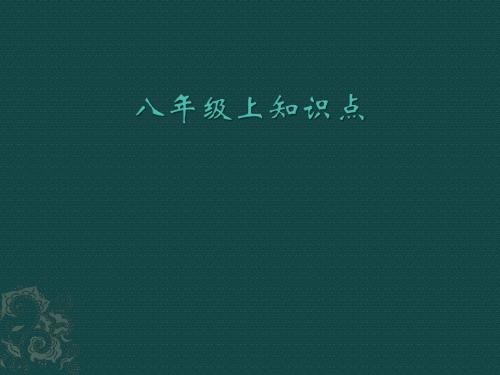
another + 基数词 + 名词 又;再;另…… 基数词 + more + 名词 another 10 minutes 10 more minutes give thanks for sth give thanks to sb 一段时间+ ago …以前 by + doing sth it is time for sb to do sth 到某人做某事的时间了 First / next/ then/ after that/ finally
grow up be sure about 确信;对…有把握 make sure 确保;查明 the meaning of different kinds of in common at the beginning of write down have to do with 关于;与…有关系
take up (尤指为消遣) 学着做;开始做 a weekly plan make the soccer team 成为足球队的一员 make a soccer team 组建一支足球队 make promises to sb 许下诺言 keep/break a promise 遵守/违背诺言
let sb do sth plan to do sth hope to do sth happen to do sth expect to do sth be ready to do sth learn to do sth
be going to 的用法 已经决定或安排要做的事;(客观迹象表明) 可能要发生的事;自然现象 常与表示将来的时间状语或者when引导的时间 状语从句连用 be not/going to + 动词原形 be 动词随主语的人称和数的变化而变化 如果计划去某地,be going to +地点 I am going to Beijing.
2020年中考英语考点04 介词(解析版)
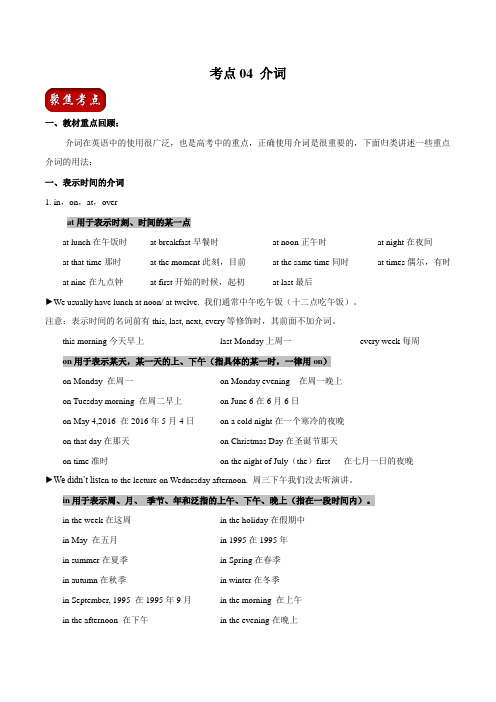
考点04 介词一、教材重点回顾:介词在英语中的使用很广泛,也是高考中的重点,正确使用介词是很重要的,下面归类讲述一些重点介词的用法:一、表示时间的介词1. in,on,at,overat用于表示时刻、时间的某一点at lunch在午饭时a t breakfast早餐时at noon正午时at night在夜间at that time那时at the moment此刻,目前at the same time同时at times偶尔,有时at nine在九点钟at first开始的时候,起初at last最后►We usually have lunch at noon/ at twelve. 我们通常中午吃午饭(十二点吃午饭)。
注意:表示时间的名词前有this, last, next, every等修饰时,其前面不加介词。
this morning今天早上last Monday上周一every week每周on用于表示某天,某一天的上、下午(指具体的某一时,一律用on)on Monday 在周一on Monday evening 在周一晚上on Tuesday morning 在周二早上on June 6在6月6日on May 4,2016 在2016年5月4日on a cold night在一个寒冷的夜晚on that day在那天on Christmas Day在圣诞节那天on time准时on the night of July(the)first 在七月一日的夜晚►We didn’t list en to the lecture on Wednesday afternoon. 周三下午我们没去听演讲。
in用于表示周、月、季节、年和泛指的上午、下午、晚上(指在一段时间内)。
in the week在这周in the holiday在假期中in May 在五月in 1995在1995年in summer在夏季in Spring在春季in autumn在秋季in winter在冬季in September, 1995 在1995年9月in the morning 在上午in the afternoon 在下午in the evening在晚上in the 21st century在二十一世纪in time及时in an hour一个小时后in a minute一会儿,立刻►The plane took off on time. 飞机准时起飞了。
外研社八年级上册英语 Module 1 词汇和语法基础(解析版)
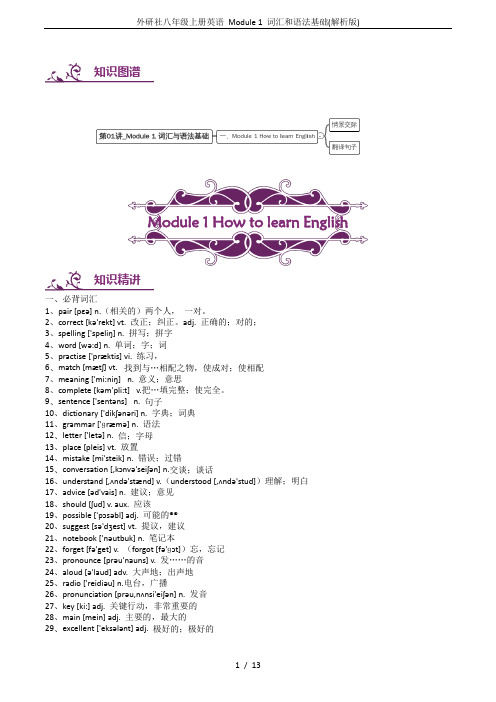
知识图谱Module 1 How to learn English知识精讲一、必背词汇1、pair [pεə] n.(相关的)两个人,一对。
2、correct [kə'rekt] vt. 改正;纠正。
adj. 正确的;对的;3、spelling ['speliŋ] n. 拼写;拼字4、word [wə:d] n. 单词;字;词5、practise ['præktis] vi. 练习,6、match [mætʃ] vt.找到与…相配之物,使成对;使相配7、meaning ['mi:niŋ]n. 意义;意思8、complete [kəm'pli:t]v.把…填完整;使完全。
9、sentence ['sentəns]n. 句子10、dictionary ['dikʃənəri] n. 字典;词典11、grammar ['ɡræmə] n. 语法12、letter ['letə] n. 信;字母13、place [pleis] vt. 放置14、mistake [mi'steik] n. 错误;过错15、conversation [,kɔnvə'seiʃən] n.交谈;谈话16、understand [,ʌndə'stænd] v.(understood [,ʌndə'stud])理解;明白17、advice [əd'vais] n. 建议;意见18、should [ʃud] v. aux. 应该19、possible ['pɔsəbl] adj. 可能的®®20、suggest [sə'dʒest] vt. 提议,建议21、notebook ['nəutbuk] n. 笔记本22、forget [fə'get] v. (forgot [fə'ɡɔt])忘,忘记23、pronounce [prəu'nauns] v. 发……的音24、aloud [ə'laud] adv. 大声地;出声地25、radio ['reidiəu] n.电台,广播26、pronunciation [prəu,nʌnsi'eiʃən] n. 发音27、key [ki:] adj. 关键行动,非常重要的28、main [mein] adj. 主要的,最大的29、excellent ['eksələnt] adj. 极好的;极好的30、agree [ə'ɡri:] vt. 同意;赞同31、quickly ['kwikli] adv. 迅速地;快地32、vocabulary [vəu'kæbjuləri] n. 词汇;词汇量33、natural ['nætʃərəl] adj. 合理的;合乎常情的34、improve [im'pru:v]vt. 改善,改进35、basic ['beisik] adj. 主要的;基础的36、time [taim] n. 回;次37、advise [əd'vaiz] vt.向…提出意见;忠告38、shy [ʃai] adj. 害羞的;腼腆的二、重点词汇1. suggest verb /səˈdʒest/to mention an idea, possible plan, or action for other people to consider提议;建议1). I suggested an Italian restaurant near the station for the party.我建议聚会去火车站附近的一家意大利餐馆。
中考英语介词之介词辨析(含答案)专项练习

中考英语-介词之介词辨析〔含答案〕-专项练习一、单项选择题1.Desks are made____ wood and paper is made ____wood, too.A.of ;fromB.from;ofC.of;inD.from;by2.You can call me Saturday morning. I'll be at home then.A.inB.onC.atD.of3.The disabled people feel grateful _______ you ________ your help.A.for; toB.to; forC.for; forD.to; to4.Nobody can prevent us _______ becoming good friends.A.fromB.ofC.toD.with5.The ID card is ______ the backpack.A.inB.atC.forD.to6.Please call Mr. White _______ 584-896.A.inB.atC.onD.with7.My mother always compares me _____ others, I am very annoyed.A.withB.toC.forD.about8.— What do you think _______ your mother, Tony?— She is very nice and friendly, although sometimes she is so strict ______ my study.A.about, atB.of, aboutC./, aboutD.of, with9.What are you busy the Internet?A.search forB.to search forC.searching forD.searching for on10.This text is on a dog saving its master. It is very moving.A.inB.aboutC.to11._____ birth, a baby panda_______ about 0.2 kilos.A.On; weighB.On; weighsC.At; weighsD.When; weigh12.We need to walk the farm to get to the city.A.atB.ofC.throughD.with13.We'll have dinner at Qianxilo ng Restaurant, which is famous ____ its food.A.ofB.toC.forD.as14.Mr. Mott went vacation last month.A.inB.onC.atD.for15.—Where is North Korea?—It lies ______ the northeast of China.A.onB.toC.inD.at16.When the man walked ______ the library, he found a cat at the corner.A.passB.pastC.passedD.by17.Kids________130cm are for free rides in the public transport system.A.underB.belowC.overD.above18.Linda is good _______ English and Chinese.A.inB.atC.ofD.on19.Everybody rose and clapped their hands the end of the concert.A.byB.inC.atD.for20.I hope we'll study ________ home ________ computers in the future.A.in; withB.at; onC.at; withD.in; on21. China successfully hosted the Belt and Road Forum_________May, 2021.A.onB.inC.by22.In some ways, Lily and Lucy look ________, but the twins are a little different ________ each other.A.same; fromB.the same; fromC.the same; asD.same; as23.We usually do some cleaning _____ weekends.A.forB.onC.overD.in24.—Where are his family?—They are all vacation now.A.atB.ofC.onD.for25.Welcome ________ our school, Miss Liu.A.backB.toC.onD.in26.Many people like swimming summer.A.atB.inC.onD.to27.—What time do you go to bed?—about a quarter to ten.A.ForB.InC.AtD.On28.Most children like reading books Zheng Yuanjie, for example, the book MR. LUOKE.A.byB.ofC.fromD.at29.Ma Yun, the chairperson of Alibaba Group, has made much money the Internet.A.throughB.alongC.acrossD.towards30.She had to sell the house even though it was her own wishes.A.aboveB.onC.againstD.for31.She got out _______ the shower and had a quick breakfast.A.atB.toC.onD.of32.— What do you usually do _____ weekdays after school?— I usually read books.A.inB.atC.onD.for33.The blackboard is _________ our classroom.A.in front ofB.next toC.in the front ofD.between34.Ice is not often seen here in winter as the temperature normally stays zero.A.upB.downC.aboveD.below35.-- Is carbon (碳) made ________ ink ?-- Of course, it is.A.ofB.fromC.into二、填空题36.根据句意及汉语提示完成单词①Many books can tell you how to eat ________ (好).② What do you often do to keep ________ (安康的)?③I found my lost basketball ________ (在……下面) the bed.④How many ________ (人) are there in your family?⑤Who can ________ (答复) this question, please?答案解析局部一、单项选择题1.Desks are made____ wood and paper is made ____wood, too.A.of ;fromB.from;ofC.of;inD.from;by 【答案】A【考点】固定搭配,介词辨析【解析】【分析】句意:桌子是用木头做的,纸也是用木头制成的。
